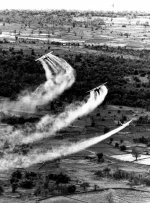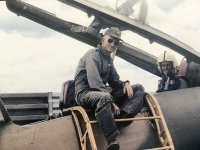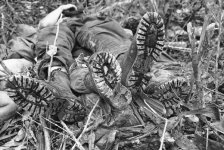
Aircraft spraying Agent Orange during Operation Ranch Hand
Agent Orange and Us
During the Vietnam War, the United States sprayed some 20 million gallons of the defoliant known as Agent Orange over South Vietnam, Cambodia and Laos. Nearly four million people were exposed to the chemical, which the government claimed was non-toxic. The government was wrong: Fifty years later, approximately one million people in Asia and the United States suffer from a range of disorders, including multiple forms of cancer, that have been linked to Agent Orange exposure.
I recently had the chance to speak with two veterans, Mike Morris and Dick Pirozzolo, who were exposed to Agent Orange and later suffered from related maladies.
Clay Risen: Can you talk about your exposure to Agent Orange?
Mike Morris: I was in the infantry in 1967, serving first on the coast south of Chu Lai, then up in the mountains west of Danang, and then inland toward the Laos/Cambodia border. As infantry, you never knew what was going on. You were isolated in the boondocks. I never knew anything about Agent Orange, or any defoliant. But I did have a couple of incidents. One time we were on patrol, and we stumbled into this valley, and suddenly there was no jungle. No jungle at all. Everything was rotting. There were no leaves on the trees.
All of this went into the “deep file” until 2012, when I was diagnosed with prostate cancer. It’s a marker for Agent Orange — studies show that lethal high-grade prostate cancer, like what I had, can be directly linked to it. The Veterans Affairs doctors said we had to get on it, and in 2013 I had my prostate removed. And here I am.
Dick Pirozzolo: I served mostly in Saigon. I was in the Air Force, and I knew that Agent Orange was being sprayed. I thought it was a good thing. Later I was out in field, working at a radio relay site. If I was exposed, it was through the water and the air. Much later, Mike was telling me about his struggles with prostate cancer. Well, at the time I was dealing with bladder cancer, and as it turns out a number of bladder cancer cases are linked to Agent Orange. In addition, I've had thyroid problems stemming from Graves' disease, which may be included among four new categories of diseases presumed to be linked to Agent Orange: bladder cancer, hypothyroidism, Parkinson-like symptoms and hypertension (high blood pressure).
MM: Here we are, both veterans, 50 years removed, and we’re still dealing with the repercussions.
CR: Did you have any sense at the time that this defoliant was dangerous?
MM: Honestly, I didn’t give it much thought. I was in an active war zone, after all — these things happen. And again, we were isolated. It was like there was a giant iron door out there that shut everything out. It was weeks before we even learned about the Six Days’ War.
DP: I worked as a public information officer, and I caught glimpses. But most folks I knew thought Agent Orange was a good thing; we saw it as a positive. I do recall a couple of guys coming in once, reporters, covering the environmental consequences of the war. My impression was, come on, it’s a war. And it was the 1960s and ’70s — people didn’t have that kind of awareness.
MM: Right — we did so much destruction to the countryside, even without Agent Orange. We’d call in Arc Light, a B-52 strike all the way from Guam, and they’d tear down an entire mountainside. We’d hike through an area that had been hit by napalm, and everything would be burned, with globs of napalm still hanging from trees.
CR: When did you first start to hear about Agent Orange’s effects as a toxic substance?
MM: I became a reporter for Gannett. I’d meet with veterans with skin conditions, whose kids had birth defects. But when I talked to the V.A., they totally refused to help them.
DP: I think what broke things was a class-action lawsuit against six chemical companies that was settled in 1984. Once that prevailed, things really began to change at the V.A.
CR: It’s kind of striking to think that the V.A., which was supposed to help veterans, was completely ignoring their claims. I gather that’s changed?
MM: The V.A. literally saved my life. But today’s V.A. is not like the V.A. I encountered in 1968. When I got back from Vietnam, my dad, a disable World War II veteran, said, go down there. But in 1968, ’69, it was a freaking tomb. We were widgets. I met with a shrink who just threw meds at me. I had a lot of friends who got into drugs that way.
DP: Yes, the V.A. has totally changed. There are many medical conditions that the V.A. now accepts are caused by Agent Orange exposure — you don’t have to prove anything. And they will take care of you. And the service is much better. Every town has a local VA representative, who along with organizations like the American Legion and Disabled American Veterans will help vets apply for VA benefits.
CR: What else has changed?
DP: The advent of social media has meant that the internet has become a forum for talking about Agent Orange and sharing information. And there’s just generally more access to information now than before.
MM: The whole experience of being a veteran is different. We’re much less reluctant to hide our service. We feel it’s time to get out. Veterans today of all ages are more respected, and that’s helped us talk about Agent Orange and what it did to us.
Dick Pirozzolo served in the Air Force in Vietnam and is the founder of Pirozzolo Company Public Relations. Mike Morris served in the Army and is a retired newspaper reporter. They are the authors of the novel “Escape From Saigon.”




